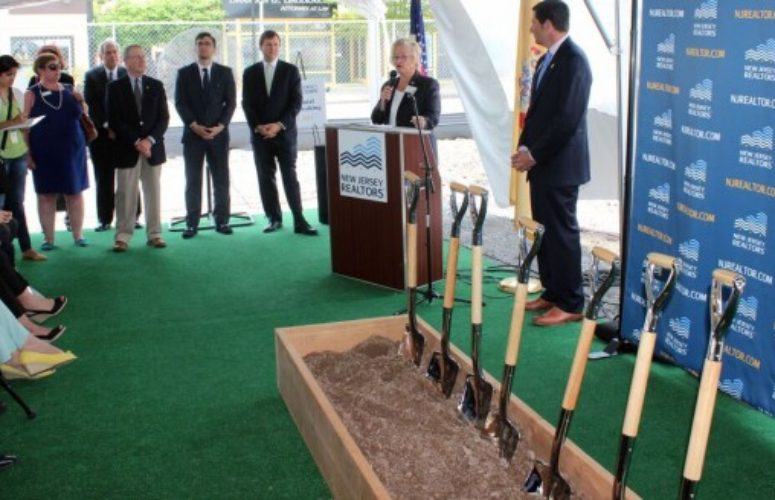
Governor Christie Stands With Trenton To Revitalize City’s Downtown With Private Investment
On Sep 7, 2016Advancing a comprehensive strategy to spur economic development and private investment, Governor Chris Christie today announced plans to attract more private investment by reducing the footprint of State Office buildings in downtown Trenton. With local leaders on board, this initiative will create more opportunities for private-sector employment, innovation, modern housing and recreation.
In concert with the Trenton Office Building project, several State office buildings will be demolished in order to pave the way for new private investment, fostering a climate for more jobs and new opportunities to create a vibrant downtown scene. For the project, the New Jersey Department Treasury requested New Jersey Economic Development Authority (EDA) officials to undertake a feasibility study in 2015 that would identify the most cost effective solution for the relocation of the Health, Agriculture and Taxation State office buildings in the City. As recommended by the study and as approved by the New Jersey Division of Property Management & Construction (DPMC) and the City of Trenton, the project will include the construction of a new, seven story, 175,000-square-foot building on the northwest corner of John Fitch Way and South Warren Street to house Taxation, and, the construction of a new, five story, 135,000-square-foot building on the southwest corner of North Willow and West Hanover Streets to house Agriculture and Health. That project would represent a reduction of more than 27 percent of total square footage, which due to more efficient buildings, would result in savings for taxpayers.
“This partnership with the private sector will reinvigorate one of the most heavily trafficked areas of Trenton into a dynamic downtown environment that benefits residents, workers and investors,” said Governor Christie. “This initiative will create more private-sector jobs and a stronger Capital City to attract new residents and visitors. With my administration having rightsized the state-employee workforce, we can now ease the State office building footprint to help expedite Trenton’s revitalization, anchored by the new Thomas Edison School of Nursing and other nearby redevelopment.”
“I welcome this investment in Trenton,” said Mayor Eric Jackson. “Every capital project that is undertaken in Trenton is a strong indicator of our collective work to advance our capital city’s economic revival, and it is a monumental effort that begins with our partners in the public and private sectors, such as Governor Christie, Greater Trenton, and the New Jersey Economic Development Authority.”
To move the State office building project forward, the EDA Board will be asked on September 9th to approve interim financing of approximately $3.6 million to fund predevelopment services through a Memorandum of Understanding between EDA and DPMC. Upon DPMC authorizing the issuance of bonds for construction and executing the lease for the two buildings, the EDA would be charged with completing the construction design, obtaining necessary permits and approvals, and constructing the buildings.
“The State office building project will strengthen the momentum building in the great City of Trenton,” said George Sowa, CEO of Greater Trenton, a new, independent 501(c)(3) not-for-profit economic development entity dedicated to promoting economic revitalization in the Capital City. “By marketing Trenton’s many assets and utilizing existing economic development tools, today’s announcement will help us to attract new private investment and facilitate the transfer of state owned development parcels – a critical step in our revitalization strategy.”
Today’s announcement was made at the site of the Roebling Lofts, a mixed-use development that serves as a beacon of progress and illustrates that the City is becoming a place of increased opportunity. The Lofts project will transform the old Roebling Steel building into rental lofts and apartments. Vacant for nearly 20 years, the structure represents the first of four John A. Roebling’s Sons buildings planned for rehabilitation by HHG Development, including multi-family lofts, two-bedroom lofts, and one-bedroom units with future plans to add restaurant/retail space from the ground up.
The Roebling Lofts project was able to move forward as a result of the New Jersey Economic Opportunity Act (EOA), signed into law by Governor Christie in 2013. That bipartisan legislation streamlined and enhanced the State’s tax incentives, creating “Grow New Jersey” as the state’s main job creation and retention incentive program, and the “Economic Redevelopment and Growth Program” (ERG) as New Jersey’s key developer incentive program. EOA emphasized spurring development and private sector job growth in newly created Garden State Growth Zones, including the City of Trenton, where projects benefit from significantly lower eligibility thresholds and higher incentive levels. To date under the EOA, the EDA has approved over $69.8 million to support five job-creating projects in the Capital City. Including Roebling Lofts, these projects involve private investment of nearly $107 million.
Additionally, EDA staffs the Capital City Redevelopment Corporation (CCRC), which was created to plan, coordinate and promote public and private development within Trenton’s capital district. EDA has also provided technical assistance on the sale of the Van Sciver and Watkins Stove Buildings, located on South Broad Street and owned by the State, to implement a mixed-use redevelopment project along the South Broad Street commercial corridor; and participated in the selection of a private developer to renovate the historic Bell Building, which is expected to include retail space, loft style apartments and be home to the Trenton YMCA. These projects are in addition to the recently-completed headquarters of the New Jersey Realtors Association on Hamilton Avenue, Thomas Edison State University’s new nursing school on West State Street, and Mercer County Community College’s expansion on North Broad Street.
Related Articles:





